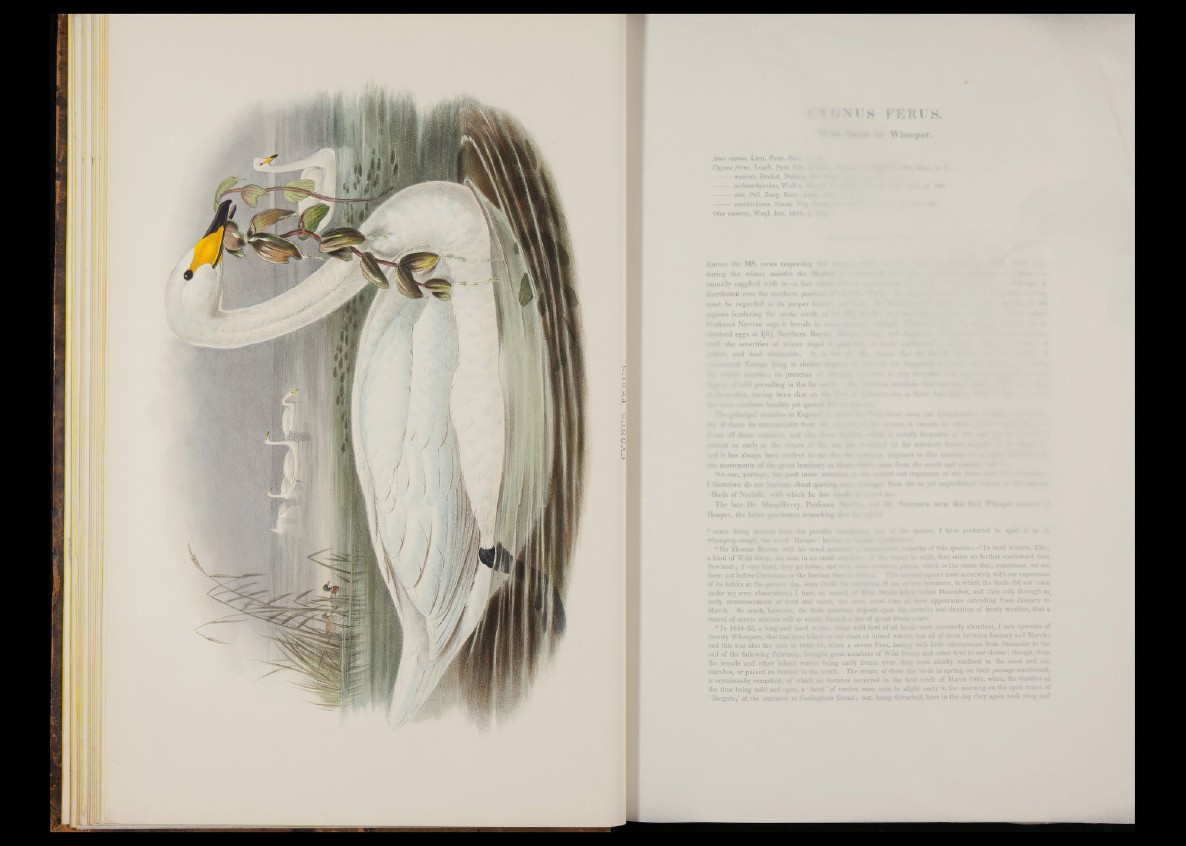
I S F K R U S.
Anas cygnus, Linn. Faun, fNM
Cygnus ferns, Leach, Sysi. C*S
■—— musicus, Bechst. Natan
me lanorkynchus, W o lf u
ohr, Pall. Zoog. Rov-
Olor musicus, Wagl. Isis, 1832
Among the MS. notes respecting *.?
during the winter months the 8p
annually supplied with it— a feet *
distributed over the northern port»«
must be regarded as its proper hr«
regions bordering the arctic circle
Professor Newton says it breeds m
‘obtained eggs at IjS). Northern 11 ir
the severities of winter iniir
■%■}■ its presence 4
*w INM prevailing in the fear
m M--- tptifafli,. bwittsr been shot on
Ik1 fBtflKMiff ctatatfes in Engl,**-«$• j>
n^reut as early as the returu 0 ■
ih0 it has always bee« evident to at« fl
55ic movements o f the great luminary **■
No one,' perhap*. has paid more ati*
I therefore do not h es ita te about quoth
' Birds o f Norfolk.,1 with which he has
The late Dr. Maegillivray, Professo
Hooper, the fetter gentleman remarking
“ name being <imv«d from the peculiar w te 0 ttn apecies, I have preferred to spell it »* *
whooping-cough, the word ‘ Hooper' ha v :'=i w
“ Sir Thomas Brows, with his usual accurst'g ■&< -v' reasarfcs o f this species:—‘ In hard winters, Elk«,
a kind of Wild Sviv is, are seen in no smaii wtpfeflg -•* :‘";v wHttfer mild, they come no further southward than
Scotland; if very hard, they go lower, and <mv>- -wartifestt* phuto*, which is the cause that, sometimes, we see
them not before ChrotsMs or the hardest then- Mi ■ This» feuMtatffc agrees most accurately with our experience
of its habits at the pres*®* day, since (with tike tiMfijmjfet of on« or two instances, in which the birds did not come
under my own observation) I hare no record «f Wld Swans k !■'•••: before December, and then only through an
early commencement of frost and mow, i L- mMUM wrnal time « f flu«? appearance extending from January to
March. So much, however, do thtnr aomher« upon the severity and duration of frosty weather, that a
record of severe winters will as surely furhwik a fort of great Swa n y.-ars.
“ In 1854-55, a long and hard waww, when wild fowl of all kinds were extremely abundant, I saw upwards of
twenty Whoopees, that had been kilkd tm our coast or inland water*, hut all of them between January and March
and this was also the case in 186# 61, when a severe frost, lasting with little intermission from December to the
end of the following February, brought great numbers of Wild Swans and other fowl to our shores; though, from
the broads and other inland waffctt* being early frozen over, they were chiefly confined to the coast and at
marshes, or passed on further to the south. The return of these f e f birds in spring, on their passage northward,
is occasionally remarked, of which an instance occurred in the first week of March 1861, when, the weather at
the time being mild and open, a * herd * of twelve were seen to alight early in the morning on the open water of
1 Bargate,’ at the entrance to Surlfegbam Broad; but, being disturbed, later in the day they again took wing and